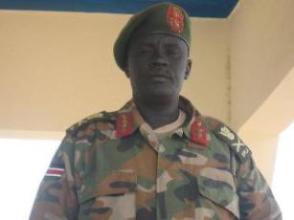Ex-South Sudan army general says forces assembling for operation
June 14, 2014 (JUBA) – A South Sudanese army general who recently defected to the country’s opposition forces said he has started assembling his fighters to start immediate operations to liberate citizens from the bondage of a “dictatorial” regime.

“When I announced last month that I have decided again to resume the same cause for which I first stopped my education and went to the bush to fight for freedom and liberate our people from the bondage of dictatorial tendencies and injustices, it also meant a declaration to return to the field to lead the operation myself, which I have already started”, Gen. Aturjong told Sudan Tribune Saturday.
“We are now assembling our forces and very soon you will hear big developments to relief our people”, he claimed.
Formerly the army’s sixth division commander in Northern Bahr el Ghazal sate, Gen. Aturjong said he chose to join the opposition in order to liberate people allegedly suffering in the country since the 2005 Comprehensive Peace Agreement (CPA) was signed. The accord ended over two decades of the north-south Sudan civil war.
“Our objective, which is the main goal now, is to topple first the tyrant to liberate our people from the bondage and mismanagement of their affairs by the few of self-interest group”, he said
It is still unclear where the former army commander would begin his operation against government forces and establishments, with military sources anticipating possibilities he could establish first his base in Bahr el Ghazal before commencing actual military offensive.
Several government officials and observers have Sudan Tribune on Saturday that the situation on the ground in the three states of Warrap, Western and Northern Bahr el Ghazal was rapidly changing and worrying. A number of officials have openly blamed president Kiir for his reluctance to intervene in the political differences that for long existed within the Aweil community, despite repeated calls.
“The defection of General Dau is starting to bear impact on the ground. Nobody is talking about it in the open but if you assess the mood on the face of some of the Aweil prominent figures anywhere, you find unanimous dissatisfaction of the way the leadership had managed their political differences”, an observer told Sudan Tribune.
“There are people who blame the president for failing to pay an attention to their pleas and address them promptly and appropriately. They say defection of General Dau was something which could have been averted if the president had shown leadership”, he added.
There are widespread fears of this resistance gaining local support owing to the popularity of the general and the kind of message he has been spreading since his defection to rebels last month.
Failure by regional leaders to condemn the current rebellion, noted the political observer, indicates the level of frustration by the international community and the region with the way president Kiir was managing internal and diplomatic affairs without external involvement.
“There are people in the government taking advantage of the breakdown of the state authority to advance their own interests by making it a pressure on the government to keep them in their positions by running around and between the communities and the government as the only people who knows how to handle the situation”, the observer told Sudan Tribune.
“Signs are already emerging that the current defection in the army and from government officials and party members is backed by politicians with and military officers with the connection to the outside world and the region”, he added.
He further claimed corruption and sectarianism were widespread problems in the security forces, with little sense of the professionalism or loyalty to the Juba government.
“Some government soldiers from other ethnic communities in other region tend to serve in areas, where many of them are demoralised by the idea of against members of their own communities, forcing them to either abandon their positions in the deployment areas or join the forces of rebellion”, he alleged.
“Other organised forces like police, which are usually drawn from the local populations are so vulnerable to local pressures like intimidation. In some cases, they are forced to rebel or flee the areas of their deployment to escape being hurt or killed”, he added.
(ST)
